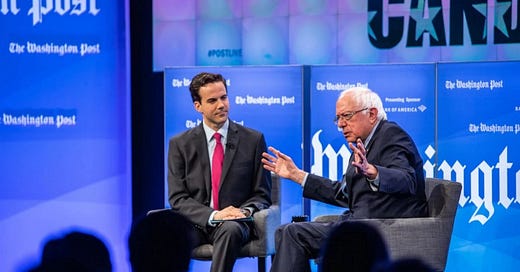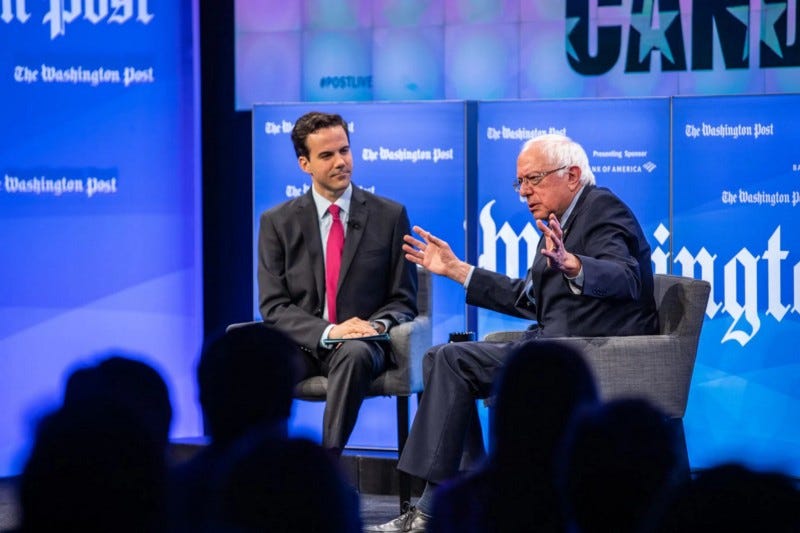For Bernie, The Washington Post’s Hatred Is Pure
The Post is apoplectic that Bernie would call out its bias.
The Post is apoplectic that Bernie would call out its bias.
The late Irish-American journalist Alexander Cockburn used to test interns at the Nation by asking them a simple question: “Is your hate pure?” Cockburn’s reason for posing this question was to assess the depth of the interns’ disdain for the perpetrators of injustice, and while he was not always satisfied with the responses he got, he could at least comfort himself with the fiery passion of his own hatred. The form of journalism he practiced, which reflected his basic commitment to hatred of the unjust, aimed to aid the downtrodden and hold the powerful to account. It could not be more different from the sort of journalism prevalent in today’s establishment media.
Take a stalwart of the liberal establishment press, the Washington Post, for example. The Post seems to operate, similar to Cockburn, based on a principle of hatred for one’s enemies. The problem, however, is that many of the Post’s enemies would never have made Cockburn’s enemies list: the Post’s targets are all too often in the crosshairs not for being corrupt elites but principally for bucking the elite consensus.
Perhaps the most obvious person the Post has singled out along these lines is Bernie Sanders. Even outside the op-ed section of the paper, the anti-Sanders bias is staggering. In March of 2016, for instance, the Post ran 16 anti-Sanders stories over the span of 16 hours, almost all of which fell outside of the op-ed section. Moreover, the Post’s Fact Checker has for the last few years served as a rich source of anti-Sanders hit jobs. It is managed by Glenn Kessler, who as head fact-checker has, as well as any supposedly objective journalist, consistently deployed the cloak of “objectivity” to disguise propaganda as reporting. Kessler has a long track record of smearing Sanders, and among his more recent attacks on the candidate was a “fact-check” that took issue with Sanders’s characterization of eight million people as “[m]illions of Americans.” Even more recently, Kessler dismissed Sanders’s accurate statement that “Three people in this country own more wealth than the bottom half of America” as “not especially meaningful.” Again, he did so in a “fact check,” not an op-ed.
It is the op-ed section, though, where the Post’s hatred for Sanders appears in its purest form. If you had paid attention to the Post editorial board’s bitching during the 2016 race, you would have witnessed it repeatedly tearing into Sanders for daring to challenge D.C. orthodoxy and propose basic social democratic reforms. The Post’s op-ed pages at that time were absurdly slanted against Sanders, with a broad analysis covering the period of January to May 2016 finding that “Of the Post stories that could be said to take an obvious stand [on Sanders], the negative outnumbered the positive roughly five to one.”
The Post has done anything but let up this election cycle. During the first couple of days after Sanders announced his presidential bid in February, four egregiously idiotic anti-Sanders hit pieces graced the Post’s op-ed pages. And just a couple of weeks ago, after Sanders and Elizabeth Warren heaped about a half-dozen moderates in a ditch during the second round of Democratic debates, the Post’s editorial board came to the moderates’ defense with an article questioning why Sanders and Warren have gone through the trouble of running for president “to promote ideas that can’t work.” (For the editorial board, progressive proposals like Medicare for All do not “meet a baseline degree of factual plausibility” — sounds like Kessler had an input here.)
With all this in mind, the general reaction to Sanders’s recent criticism of the Post can’t be treated as anything other than ridiculous. Sanders made the comments that triggered a firestorm of indignant responses from the establishment media over the last few days during an August 12th town hall in New Hampshire:
Sanders: “Anybody here know how much Amazon paid in taxes last year?”
Crowd: “Nothing.”
Sanders: “I talk about that all of the time, and then I wonder why the Washington Post, which is owned by Jeff Bezos, who owns Amazon, doesn’t write particularly good articles about me. I don’t know why, but I guess maybe there’s a connection.”
It doesn’t take a genius to realize that Sanders is not alleging in this exchange that Bezos is literally making editorial decisions for the paper, although in some cases, including when the Post has gone after Sanders, it’s hard not to suspect at least indirect influence from Bezos. Rather, Sanders’s criticism of the Post is rooted in a broad critique about ownership of the media by the wealthy elite. He clarified this point on August 13th, stating,
We are taking on corporate America. Large corporations own the media in America, by and large, and I think there is a framework, about how the corporate media focuses on politics. That is my concern. It’s not that Jeff Bezos is on the phone every day; he’s not.
Sanders’s comments recall some made by George Orwell about the British press in the 1940s:
Unpopular ideas can be silenced, and inconvenient facts kept dark, without the need for any official ban. Anyone who has lived long in a foreign country will know of instances of sensational items of news — things which on their own merits would get the big headlines — being kept right out of the British press, not because the Government intervened but because of a general tacit agreement that ‘it wouldn’t do’ to mention that particular fact. So far as the daily newspapers go, this is easy to understand. The British press is extremely centralised, and most of it is owned by wealthy men who have every motive to be dishonest on certain important topics.
Sanders’s critique, as well as the critique offered by Orwell over 70 years ago, shouldn’t be controversial. The idea that a newspaper owned by the richest man in the world would be fighting for the downtrodden and oppressed, many of whom happen to be employees of that man, is far more fantastical than the suggestion that the paper’s passionate hatred for someone dedicated to fighting for the downtrodden and oppressed might have something to do with the identity of the paper’s owner. To adapt a point Noam Chomsky has made, the problem is not direct censorship of the Post by Jeff Bezos; rather, it’s that Bezos would probably only decide to buy a newspaper if it didn’t need to be censored, or only required minimal pressure, to serve his interests and the broader interests of his social class — the wealthy elite. And he wouldn’t maintain ownership of a newspaper if it broke from that subservient role.
Nevertheless, in a fierce display that accuracy isn’t always the concern, establishment media outlets have utterly lost their shit over Sanders’s remarks. Shortly after Sanders criticized the Post, media figures latched onto comparisons of Sanders to Trump, a tactic they’ve been using for a while now, and accused Sanders of floating a conspiracy theory. Some of the most comical reactions appeared in the Post itself. Excluding a fairly unbiased article by Dave Weigel, Post articles on the Sanders statements included:
(1) A “straight news” piece with the (totally neutral) headline “Sanders accuses The Post of biased coverage due to his criticism of Amazon, cites no evidence.” The article ends with a not-so-subtle comparison of Sanders to Trump: “President Trump has also repeatedly complained about The Post’s coverage of him and his administration. Last year, the president falsely stated that the newspaper operates as a lobbyist for Amazon.”
(2) An op-ed by Jennifer Rubin, who has a decorated history of attacking Sanders, in which she poignantly observes that Sanders not only sounds like Trump but “also plays victim just like Trump!”
(3) An article by Aaron Blake taking issue with a recent response by Sanders to a reporter, when Sanders had made the hyperbolic statement that “Not one reporter has ever asked me: ‘Bernie, what are you going to do about the grotesque wealth and income inequality?’” Blake rates Sanders’s claim as false but doesn’t mention that if Sanders simply said he’d “almost never” been asked that question he would have been correct. Blake goes on to defend the media against complaints about lack of coverage of inequality, partly by arguing that Sanders talks about inequality so much that there’s not much point in asking him about it.
(4) A delusional rant from Paul Waldman dismissing ideological bias as “usually the least important” bias of the media’s and arguing that Sanders’s criticisms of the Post just reflect Sanders’s wish that “he could be covered more the way he was in 2016.” In Waldman’s alternative reality, Sanders’s 2016 “candidacy was a captivating new phenomenon” which elicited “story after story about this fascinating campaign, particularly the unlikely fact that a rumpled 74-year-old had become the hero of college students everywhere. [Reporters] covered his policy proposals, but they also covered all the attendant human-interest sidelights such as people getting Bernie tattoos.”
As Orwell once quipped, “Circus dogs jump when the trainer cracks his whip, but the really well-trained dog is the one that turns his somersault when there is no whip.” The best trained dog, I would add, is the one that not only performs his trick without the whip but yaps at anyone who accuses him of performing the trick and lunges at anyone who suggests that his behavior is just what his owner was looking for in a dog.
Note: For a more detailed discussion of anti-Sanders bias not only at the Washington Post but also the New York Times and CNN, check out my article from several months ago “When Propaganda Passes for Reporting: The Case of Bernie Sanders.”





